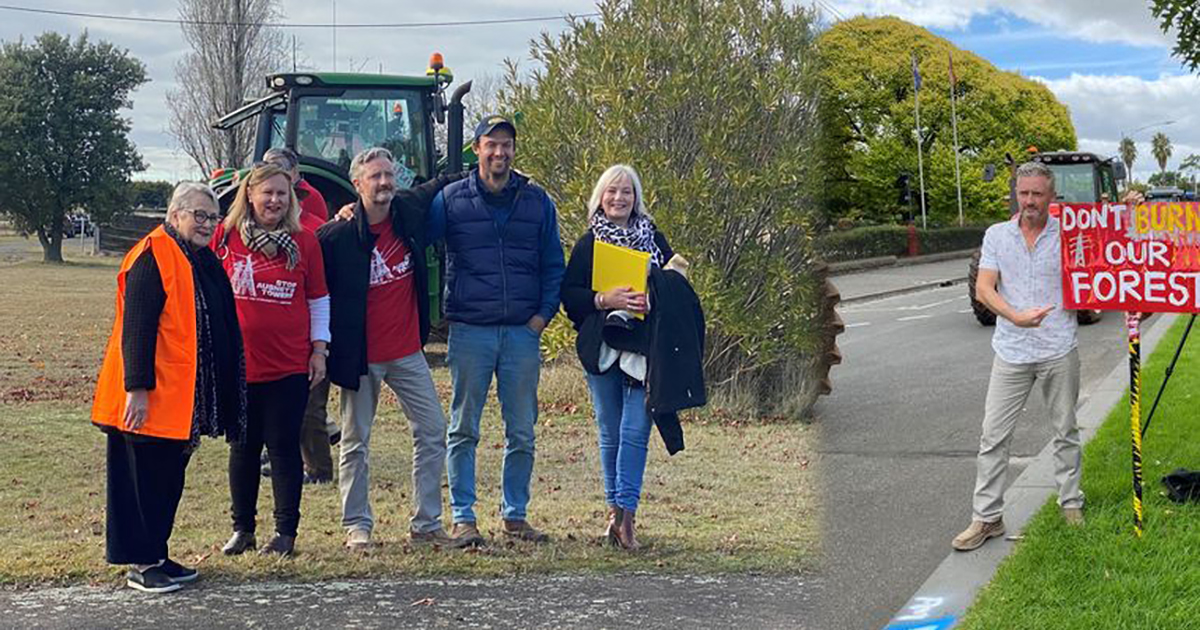High Voltage Power Lines Through Ballarat Food Bowl

(And why Stephen Curry from THE CASTLE cares)
Cate Lancashire, a Brown Hill resident of 10 years, spends her days working full time and enjoying time with her children and grandchildren who live on farming properties just outside of Ballarat. These days Cate spends her spare time organising rallies, meeting with community groups and preparing to challenge the Western Renewables Link project on behalf of thousands of farming families across Western Victoria.
In July 2022, Ms Lancashire helped to organise tractor rallies through the streets of Melbourne and Ballarat to highlight concerns about the project, which were led by none other than Stephen Curry, star of the 1997 classic Australian film The Castle.
The Western Renewables Link is “a proposed 190km overhead high-voltage electricity transmission line that will carry renewable energy from Bulgana (near Stawell) in western Victoria to Sydenham in Melbourne’s north-west.The project is critical infrastructure required to unlock the renewable energy potential of western Victoria as a key Renewable Energy Zone and will help to deliver clean and affordable energy to Victorians.” www.westernrenewableslink.com.au
But Ms Lancashire, who volunteers her time to the Campaign Committee for the Stop Ausnet’s Towers group, says “we are all for renewable energy, but we believe there is better, more advanced technology available and safer, more sustainable options that have been considered but deemed to expensive” The Stop Ausnet’s Towers group are campaigning to have the project revised and have it redirected to underground infrastructure.
“We have grave concerns about the immediate and long term impacts these high voltage transmission lines could have on the affected landowners, Class 1 agricultural food producing soils and the associated food security, industries, and the environment,” she says.
“Our concerns centre around the loss of food producing area, the potential future costs of these giant towers falling during storm or bushfire events, the massive environmental impact of the overhead lines, the very real threat of life threatening bushfires and the impact lines or towers falling over or being damaged can cause to communities like it did in recent weather events in the Dandenong Ranges,” Ms Lancashire said. “Outer suburban communities were heavily impacted and when the power lines went down in 2021. Families were left without access to food and water for weeks, livelihoods were impacted, and the emotional impacts are still being felt today.”
“With our history of bushfires in Victoria, and the Black Saturday Fires still fresh in our minds, we are extremely worried about having more high voltage power lines stretching through some of Victoria’s densest and driest bushlands such as the Wombat and Lerdederg State Forests. CFA members have confirmed they will not be able to fight fires under and around these transmission lines.”
Stephen Curry, who led the recent tractor rallies, has a vested interest in the project, as his multi-generational family property lies directly in the path of the transmission lines. And while we may joke about the serenity, there are tourism, agriculture, and environmental organisations pushing to understand exactly what the transmission lines mean for them.
Ms Lancashire said tourism and recreation organisations throughout the region, camping and glamping grounds and recreational waterways were worried about how the transmission stations and lines might deteriorate their businesses with health, environment, and visual amenity concerns potentially deterring tourists and visitors.
Closer to home, Ms Lancashire says, her initial interest in the project was piqued when her son’s farming properties were scheduled to be in the proposed direct path of the transmission lines. “We are worried that this project could spell the end of food security in Victoria. These lines are being built directly through some of the best cropping soil in the whole of Australia and the transmission lines and stations will significantly reduce the growing areas, making it impossible to farm and grow food in areas that can’t use the heavy machinery and watering techniques that modern farmers rely on.”
“Members of our group are also advocating for the environmental impacts of the project. Not only the removal of thousands of trees in our precious forests, but the removal of natural habitats for native wildlife and the emissions that will come from the proposed works,” Ms Lancashire says.
Stop Ausnet’s Towers are not the only group opposing to the Western Renewables Link, there are others such as Moorabool and Central Highlands Power Alliance, Piss Off AusNet - Spud & Spa Region and Pykes Creek - No Go Zone, to name a few.
So how does all this tie back to Brown Hill? Ms Lancashire says that while we may not be under the direct path of the transmission lines, the Brown Hill area could be affected indirectly. Many who reside in Brown Hill will have families and friendswho own property in nearby towns like Newlyn, Dean, Creswick, Gordon and Springbank. And residents may be working on farming properties where, if the growing area is significantly reduced, they may have to lay off staff, resulting in economic impacts to the Brown Hill and Ballarat areas.It also has a ripple effect on local businesses like fertiliser, spray and fuel providers and also our local processors. “It’s also important for Ballarat residents to understand what’s happening just outside our council boundaries. We believe if the transmission lines were within the City of Ballarat there would be a lot more information provided to the area and potentially a lot more push back from the community. It’s just that people don’t know what’s happening,” she says.
“What our group would love to see is the Western Renewables Link take a step back and reassess the options. There is an existing easement along the Western Highway that we believe could be used to put the transmission lines underground. The cost may be higher in the short term but in the long term over the life of the infrastructure it would remove the environmental and agricultural damage and eliminate the potential for catastrophic weather disasters in these areas.”
Ms Lancashire says, “the mental health toll that this proposal has taken on our communities is distressing. Our communities are suffering from stress, depression, anxiety, self-harming thoughts, and then the neighbours who have managed to avoid being in the transmission lines are potentially suffering from guilt as they witness their colleagues’ pain and turmoil.”
“If we are going to do renewable energy, we need to do it right the first time. And we need to protect our food industries, cultural heritage and environment and do our part to reduce the disastrous impacts of catastrophic weather events.”
A community information session was held at the Brown Hill Hall on August 19th and anyone wanting further information about the project can access the websites below.
https://www.westernrenewableslink.com.au/
https://www.stopausnetstowers.com.au/
Written by Louise Jones, Ballarat.
Photos by Cate Lancashire.
First published on Facebook 30th October 2022.

Join Now
Get Involved
The only way to make a difference is to get involved. It’s easy to sit back and wait for others to do something but when you are staring at 75-85m towers in a few years time, you will kicking yourself for not doing something when you had the chance. This is OUR only chance to stop these towers, so get involved now.
Welcome to the home of Darley Power Fight. A group of residents in Darley, Coimadai and Merrimu, united against high voltage transmission towers passing through our backyard. We came together through the realisation the transmission line will divide a narrow corridor between Darley and the Lerderderg State Park; altering landscape character, causing widespread damage to critical habitat for threatened species, increasing fire risk to the Park and thousands of residents, destroy our visual amenity, harm local agriculture and will impact businesses and property values. It will completely desecrate, in a few years, what nature has taken millions of years to create.

